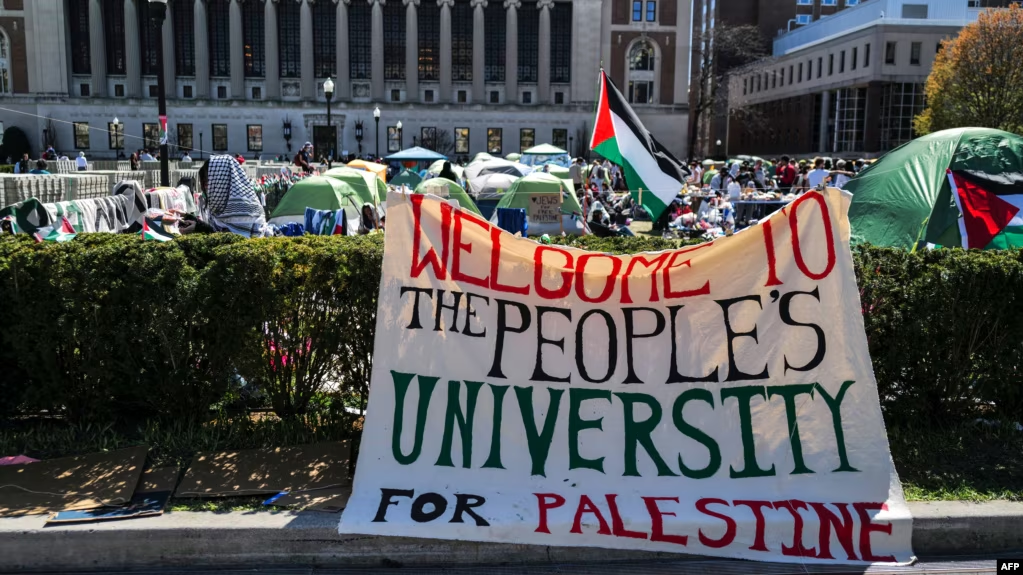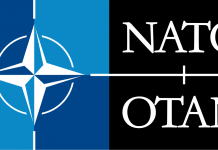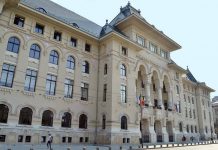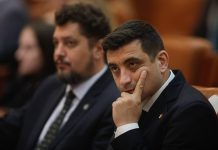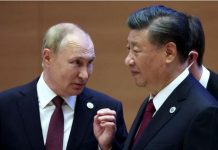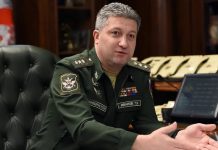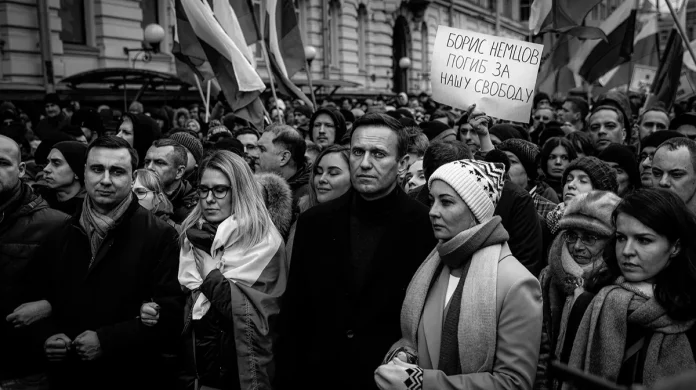But will the West be willing to truly confront the Russian dictator? Not so clear
Fifteen years ago, I met with an iconic Russian figure, a retired Kremlin leader who was a saint compared to the current resident. I had one lasting impression of Mikhail Gorbachev, the man who oversaw the dissolution of the Soviet Union, survived a coup attempt and ended the Cold War: He was afraid to death of Vladimir Putin. In our interview, he danced around any criticism of a successor he obviously despised.
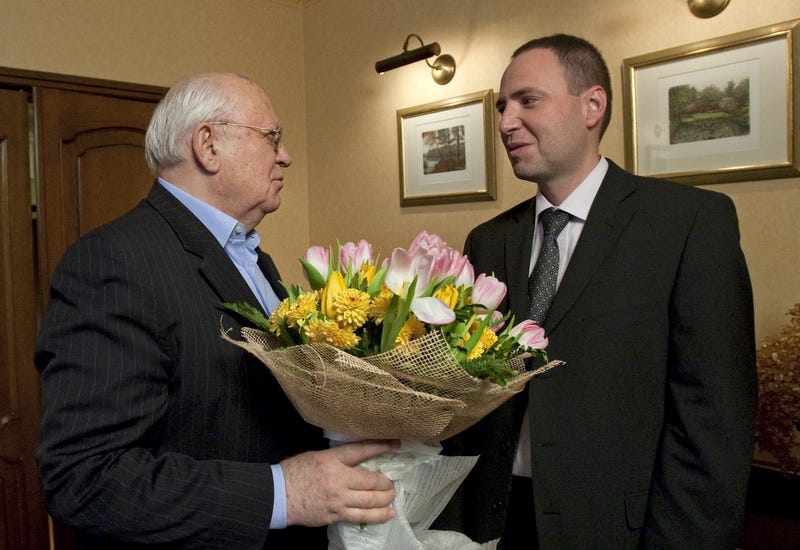
Gorbachev’s circumspection was sad but hardly shocking. After all, figures displeasing to Putin show an alarming tendency to be poisoned in London sushi bars and shot in Moscow elevators. In perhaps a sign of things to come, the candidate Putin did not support in Ukrainian elections as early as 2004 ended up after a dinner with his face dramatically disfigured. So it is not shocking that Putin has now assassinated his peskiest rival Alexey Navalny (here among friends, we need not pretend that he was “imprisoned” for “convictions” by a “court” of certain “charges”).
Navalny’s murder a few days ago was one of many – but it may be pivotal nonetheless.
The timing of Navalny’s reported death at an Arctic Circle penal colony is laden, coming around the two-year mark of Putin’s invasion of Ukraine, and a month before the latest fake presidential election in Russia. Putin – in charge as either president or prime minister since 2000 – is “running” again, having rammed through a special constitutional amendment a few years ago to get around term limits.
The symbolic timing seems right, because Navalny himself was a symbol – since he was so obviously the ultimate anti-Putin. A charismatic crowd-pleaser to Putin’s sinister misanthrope; transparent, liberal and modern where Putin is a lying, shadowy, 20th century-issue KBG ferret; a globalist half-Ukrainian whereas Putin is a hypernationalist disruptor who invaded Ukraine. Tall, young and presentable whereas the mummified Putin makes Tucker Carlson look dashing by comparison (see, below).
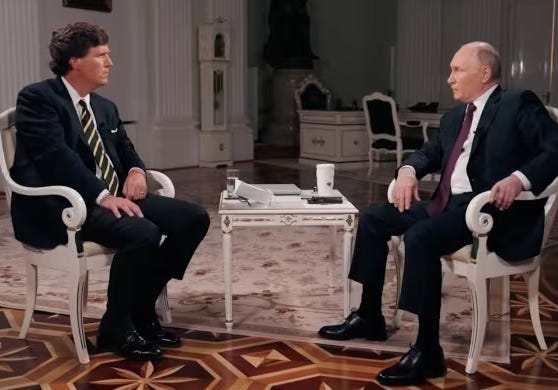
Mainly, Navalny was courageous – insanely courageous, returning to Russia in 2021 after barely surviving a poisoning attempt even though he surely knew his freedom and life were in dire danger. Putin? He’s scared of a free election and cowers in the Kremlin with his food taster (I assume). He had Navalny arrested at the airport.
Putin’s dispatching of his 47-year-old Navalny is not surprising, but it is certainly a ramping up. The last serious (and younger) rival, billionaire energy tycoon Mikhail Khodorkovsy, who dared establish an opposition political movement, was jailed from 2003 to 2013 on trumped-up charges, then released. The 60-year-old is a politer regime critic now, in exile and more mindful of the value of discretion.
Navalny was unfazed by his arrest and still ordered his team to release the two-hour documentary Putin’s Palace (which he wrote and narrated), accusing Putin of fabulous corruption and of spending over a billion dollars building an opulent imperial retreat (Putin reportedly claims an oligarch actually owns it).
The charges against Navalny were typical of cartoonishly evil regimes, being brazenly absurd: breaking parole while being in a German hospital, where he was recovering from being poisoned by a nerve agent favored by the regime. Had he died then, one wonders if they would have charged him posthumously with breaking parole on account of death. Less silly, equally false, and more serious charges followed. A photo of Navalny last week shows him robust and smiling; a day later, he “collapsed.”
Building on a tradition that goes back to Rasputin, Putin’s regime has been at it since the 2006 killings of killing of critical journalist Anna Politkovskaya (murdered in an elevator in 2006) and rogue spy Alexander Litvinenko (poisoned in London that same year). But we are certainly at a high (or low) point caused by the calamitous Ukraine war. A few months ago we witnessed the demise-by-plan-crash of mercenary leader Yevgeny Prigozhin, after he apparently tried to lead a short-lived rebellion. Others include Pavel Antov, the „sausage tycoon” who fell to his death from a hotel window in India in 2022, and Ravil Maganov, who criticized the Ukraine war and then apparently tumbled from a hospital window in Moscow.
The corrupt Russian elite sure is full of klutzes!
Putin, of course, is about much more than just vulgar assassinations. He has set the global gold standard for toxic political skullduggery. He has been widely believed to falsify Russian elections and has in effect taken over most of the Russian media to aid him – now a favored trick in other countries. Before the current term-limit dirty-trickery, he got around presidential term limits by installing Dmitry Medvedev as puppet president, making himself prime minister and then switching roles. He has since machinated to stay in power basically for life.
Well before his 2022 full-blown invasion of Ukraine, he seized Crimea from his neighbor – and has been accused of a role in shooting down a Malaysian passenger jet over the country as well. In other foreign policy, Putin interferes with elections in the United States and other countries, through digital disinformation campaigns and assorted cyber-tricks. And he basically saved Syria’s Bashar Assad., who has presided over the utter ruination of his country and is credibly accused of using chemical weapons against his people.
This malignant monkey business has infected all humanity. All over the world, outright dictators (of whom Putin is now one) and fake-democracy authoritarians (which is how he began his journey) are nefarious in undermining people’s faith in the spoken word—theirs, and anyone’s. They have used social media so successfully that it has clarified something terrifying: the digital marketplace, which in some ways reflects our actual nature and real instincts, amplifies the radical and the evil. Where do you go from that? Until we figure out what to regulate and what to ban, populists may have burned down the house.
That may be the most devastating thing: Almost no one believes that Putin is a good person, or that he speaks the truth, or that he even has the interests of the Russian people at heart—yet somehow this doesn’t hurt him. A similar phenomenon is seen with his fellow travelers, in America, Europe, and elsewhere; (they know who they are). They are bad for their countries and bad for the world yet have support. That’s bad for the underlying assumption about democracy—that people are good.
This leaves us, in the West, with a series of awkward questions. Should we want to intervene? Sure, we should. Have we the right to intervene? Complicated; imagine foreigners boycotting America because a reinstalled Donald Trump was messing with its democracy. And how effective can we be? That’s the hardest, perhaps, of all.
The West has already slapped pretty serious economic sanctions on Russia over Ukraine. To this point, they have failed, with Russia’s GDP actually growing last year (it is a good sign that Germany is now asking for tougher sanctions after the Navalny murder). Regime insiders, close to the proverbial food taster, are meanwhile somewhat insulated from market fluctuations and seem passive and remain compliant.
It is possible to be more decisive, sure. It is possible to sanction third parties like Azerbaijan that are suspected, for example, of helping Russia bust the sanctions. The West could also lobby allies and semi-allies like the United Arab Emirates and Turkey, respectively, to stop letting in Russian tourists, who have been banned across Europe. It is certainly possible to be tougher with Russia’s trading partners—is the West willing to pay the price of all that disruption, including confronting his trade partners in countries like China, which might be primed to invade Taiwan?
So an intriguing question hangs in the air: Will the killing of Navalny close the book on Putin for reasonable people around the world? Is he now utterly irredeemable, a pariah for life, and an enemy of humanity recognized as such by almost all?
Maybe so—but also not so clear. If he sued for peace in Ukraine, I bet he might find himself forgiven, or at least tolerated once more. That’s how desperate we are to avoid World War III.
Yulia Navalnaya’s twitter account briefly suspended after statements




